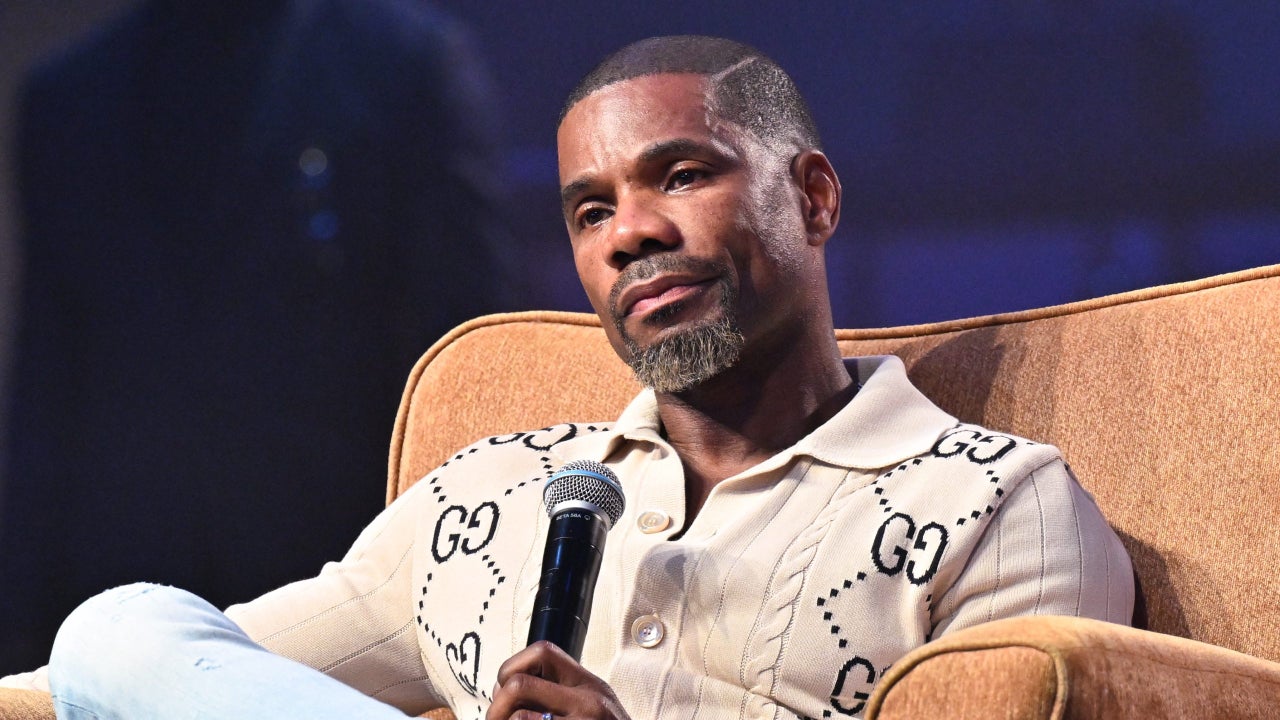


Kirk Franklin is in the middle of his Reunion Tour, alongside Tye Tribbett, David and Tamela Mann, The Clark Sisters, and Israel Houghton. This marks the Fort Worth native’s second tour following his recent circuit with Maverick City Music.



His last album Long, Live Love (2019) marked a significant departure from the creative mindset the gospel artist currently finds himself in. “I think that Long Live Love was written from the porch,” he says of his previous album, “and Father’s Day was written from the field. Long Live Love is going to the well to grab water. Father’s Day is you falling into the well screaming for somebody to get you out.”
Amidst consecutive nationwide tours, and a new album, Franklin grapples with a life-altering information—uncovering the identity of his biological father.
Throughout his discography, you’ll hear him ruminate on his childhood growing up with a man assumed to be his father on songs like “Let It Go,” from his 2005 album Hero, and “Daddy’s Song,” a song he produced and wrote for the soundtrack of Kingdom Come. Though adopted in childhood, the lack of a father was something that always eluded Franklin. On a quest to find his biological father, the gospel leader came out with his own documentary, Father’s Day: A Kirk Franklin Story, a 35-minute account of his real-life journey to finding his father.
Article continues after video.
The tear-jerking story brought to the surface deep soul wounds for the Grammy Award-winning artist. It exposed problematic family dynamics, creating a divide between Franklin and his mother, which hindered the discovery of his father’s identity. He only discovered his father’s identity by happenstance—through a family friend, at a funeral.
“It has turned my world upside down because I thought I had a daddy. I thought I had a daddy that I hated. I thought I had a daddy that was absent, and the sad truth is, that’s still my experience,” Franklin says. “Just because you get introduced to love, doesn’t mean that you naturally respond to it. I spent 53 years hating a man because he wasn’t there, but it was also a man that had this hate that he didn’t deserve,” he continues. “I don’t just wake up, and go, ‘oh, well, I had that wrong. Let me go love this guy.’ I’m feeling the numbness, like, what do I do with this?’”
The revelation of his true paternity, though validating, is simultaneously earth shattering, leaving Franklin to grapple with a tumultuous mix of emotions that he continues to process. In this journey to reassemble the missing fragments of his life, he finds solace and guidance in his faith, and in music.
His story is one of numerous stories within the Black community that contribute to the intricacy and perplexity of Black family history and genealogy. Lies that cover up past transgressions appear as a convenient solution in the short term, but they often have detrimental consequences. Leaving children—in Franklin’s case, a now grown adult—to search for who he really is, in a family member he’s never known. The manner in which Franklin uncovered the identity of his real father, coupled with his mother’s ongoing denial and manipulation, has placed significant strain on their relationship. At the time of the interview, they remain estranged.
“Not having my mother love me, not having my mother care for me, not having my mother speak kind, loving, positive words over me, has left me living with a limp the majority of my life,” Franklin says emphatically. “I have to work hard to not be a victim in a culture of Christianity that’s perfection-driven. You can find yourself digging a deeper hole for yourself. It all becomes this one big smorgasbord of challenges,” he continues.
He then reminisces about the moment he was on the phone with his doctor, who told him the results of the paternity test, describing it as an “out of body experience” and saying, “that’s the kind of stuff that happens in a doggone Spielberg movie or something. A random conversation at a funeral has led to this,” he reflects, still processing the news as if he had just received it.
During his tour stop in North Carolina, he contemplates the truth about his own parentage. Despite the exhilaration of being on stage every night, the news of his father’s identity is still rather recent. “This has happened 14 to 15 weeks ago. I am still in the process of working through it, but how it felt more than anything, was that it’s very interesting how traumas are transferable,” Franklin says over Zoom. “It was a space that was not foreign to me because of how I was raised. I was not adopted in an environment that protected me from [things] that were very painful and often overwhelming. To be exposed to this kind of news unfortunately, fit the fabric of who I already was as a man, as a kid, as a young man, and now a grown man. I’ve found myself assimilating to the trauma.”
Franklin has always expressed his truth through his music, but the documentary played a crucial role in helping him confront his trauma head-on. Prior to creating the documentary, the “Stomp” producer was deeply engrossed in creating his new album, which shares the same title as the documentary, so his creative juices were already flowing. In many ways, this project was therapy in itself. Apart from studio work, Franklin took on another role: being in front of the camera, which he says, gave him courage he needed.
“It [the documentary] helped me get through it, and I was able to hide behind Chris’ camera, as I confronted a lot of these issues,” Franklin tells ESSENCE. “It’s funny, because that’s been more regulatory than I first understood it to be. By documenting this, the camera gave me courage to confront some things that I probably would have had a lot of trepidation addressing on my own. So it’s very nuanced why I was motivated to want to do this.”
Among the many poignant moments in the documentary, one of the most climactic scenes unfolds after the revelation of Franklin’s father, Rick Hubbard. In this pivotal moment, Kirk shares this life-altering information with his son, Kerrion. “He [Kerrion] has seen me live my life without a father. It was important to me that he knew that there is a man who biologically is my dad,” Franklin explains. He and his son were estranged for quite some time, and sharing the news with him “was a point of connection that I hoped would help some level of reconciliation.”
The healing born from trauma was his album Father’s Day, released this month. The 10-song LP was the vehicle that guided him through a time that has changed his life forever, leading to a reevaluation of what Franklin had previously believed. The album personifies the dualities of life on songs such as “Welcome Home” and “All Things,” where the juxtaposition of joy and sorrow, hope and despair, weaves a tapestry of emotions that hopefully, brings listeners closer to God.
“I don’t know what I would do without this music. I don’t know what would have happened to me without this music,” Franklin explains. “It was extremely kind of God to know that it had to happen at that very moment. I needed music that speaks to the need of God in my life like never before, and the need for hurt and hope that had this dichotomy throughout the album-making process. The album became the beacon of light in the middle of the sea where I feel like I was in a boat just lost in the middle of a storm and so I’m hoping that people can feel that when they hear the music.”
While on the surface, the album and its accompanying documentary may appear to revolve around fatherhood, the underlying theme that threads its way through the album is love. The song “Try Love” offers some of Franklin’s signature sound, an upbeat melody contrasted by lyrics that delve into the challenges of entering a world that’s harsh and isolating. In fact, naming the album’s title has threefold meaning.
“It has this triple entendre. It’s what I missed, where I am, and what’s always been,” Franklin says. “I am unfortunately an individual who has always struggled with believing that he’s really loved. I’ve had to work hard at understanding the concept of love that is not based on performance. And, it has damaged me the majority of my life when it comes to my own value, and understanding the value of what love can actually be.”
Furthermore, he aspires to dispel the myth of perfectionism within Christianity and continue to reach those seeking hope. Unafraid to bare his soul in his music, he perpetually seeks truth. “In my music I’ve just got to try to find honesty and some truth to get through this because real pretty Christian pictures have never been the best for me to paint. I can’t paint the little kids walking down the hill with all the grass green and daffodils in their hands and wind blowing the hair in the cool of autumn. That ain’t my life. My life is folks getting shot, a church in the middle of a crack-induced neighborhood and people trying to figure out how to pay bills. That’s what I’m called to, and I’m comfortable there.”
He continues to find his way while navigating life with his biological father, and what’s beautiful is that he can take his time to nurture and grow their relationship. Most importantly, he is contributing to the restoration of Black fatherhood, both with his newfound father and with his own son. It’s also soothing the inner child within himself, which has always longed for a father’s love.
As Franklin shapes a path forward, he hopes the Father’s Day reminds listeners that they are not alone in their suffering, and that they can find solace and strength in the power of faith, love, and resilience. “Winning wounded. That’s what I want people to take away. To listen to this album and get up and feel like they can win,” Franklin says.







